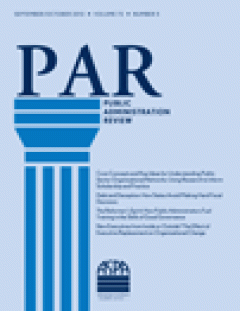Filter by

Unanswered Questions about Public Service Motivation: Designing Research to A…
As public service motivation research gains momentum, important questions emerge regarding its origins and consequences that are not addressed by existing research. The authors identify some fundamental public service motivation assumptions, including critical gaps in our current understanding of its basic tenets. The authors then discuss specific research studies that, by virtue of their findi…
- Edition
- Volume 70, Issue 5, September/October 2010. pages
- ISBN/ISSN
- 00333352
- Collation
- -
- Series Title
- Public Administration Review
- Call Number
- -

A Strategy for Building Public Service Motivation Research Internationally
As public service motivation research grows qualitatively and quantitatively, some scholars question its appropriateness for international applications. This essay sets out a strategy of convergence for international research and measurement approaches. Studies that assess commonalities in public service motivation content internationally are analyzed in order to develop a broader conceptual an…
- Edition
- Volume 70, Issue 5, September/October 2010. pages
- ISBN/ISSN
- 00333352
- Collation
- -
- Series Title
- Public Administration Review
- Call Number
- -

Revisiting the Motivational Bases of Public Service: Twenty Years of Research…
How has research regarding public service motivation evolved since James L. Perry and Lois Recascino Wise published their essay �The Motivational Bases of Public Service� 20 years ago? The authors assess subsequent studies in public administration and in social and behavioral sciences as well as evolving definitions of public service motivation. What have we learned about public service motivat…
- Edition
- Volume 70, Issue 5, September/October 2010. pages
- ISBN/ISSN
- 00333352
- Collation
- -
- Series Title
- Public Administration Review
- Call Number
- -

Transformational Leadership and Public Service Motivation: Driving Individual…
- Edition
- Volume 70, Issue 5, September/October 2010. pages
- ISBN/ISSN
- 00333352
- Collation
- -
- Series Title
- Public Administration Review
- Call Number
- -
- Edition
- Volume 70, Issue 5, September/October 2010. pages
- ISBN/ISSN
- 00333352
- Collation
- -
- Series Title
- Public Administration Review
- Call Number
- -

Beyond Bureaucracy—Public Administration as Political Integrator and Non-We…
The political role of public administration holds an ambiguous status in public administration theory. The dominant paradigms of the discipline offer more or less negative perspectives. Max Weber�s notion of bureaucracy conceives public administration as the apolitical tool of government, while the public choice school conceives it as the realm of individual selfishness and rent seeking at taxp…
- Edition
- Volume 70, Issue 5, September/October 2010, pages
- ISBN/ISSN
- 00333352
- Collation
- -
- Series Title
- Public Administration Review
- Call Number
- -

Monitoring across Sectors: Examining the Effect of Nonprofit and For-Profit C…
What is the effect of contractors' nonprofit and for-profit ownership on the scope and nature of performance measurement used by government agencies? Quantitative and qualitative data were generated through semistructured interviews administered to a sample of state and local public agencies and private contractors across five jurisdictions. The findings of this study suggest that monitoring of…
- Edition
- Volume 70, Issue 5, September/October 2010, pages
- ISBN/ISSN
- 00333352
- Collation
- -
- Series Title
- Public Administration Review
- Call Number
- -

Wakeup Call: Strategic Management, Network Alarms, and Performance
New empirical evidence suggests that service performance is shaped by the strategies adopted by public organizations and the networking behavior of public managers. Strategy captures two central behavioral aspects of public organizations: the way in which objectives and actions are selected (processes), and an organization�s approach to service delivery (content). Networking is similarly concer…
- Edition
- Volume 70, Issue 5, September/October 2010, pages
- ISBN/ISSN
- 00333352
- Collation
- -
- Series Title
- Public Administration Review
- Call Number
- -

Analytics and Beliefs: Competing Explanations for Defining Problems and Choos…
The rationale for collaborative environmental management often hinges on two factors: first, specialized training creates biased analytics that require multidisciplinary approaches to solve policy problems; second, normative beliefs among competing actors must be included in policy making to give the process legitimacy and to decide trans-scientific problems. These two factors are tested as dri…
- Edition
- Volume 70, Issue 5, September/October 2010, pages
- ISBN/ISSN
- 00333352
- Collation
- -
- Series Title
- Public Administration Review
- Call Number
- -

Guiding Regionalism and Reform from the Court: Judge John Feikens
the reform of state and local government agencies. Some scholars describe such a judicial role in institutional reform as �managerial.� This profile examines the managerial role of Judge John Feikens, who, since 1977, has supervised the Detroit Water and Sewerage Department's attempts to comply with federal laws on wastewater treatment and water quality. Through his sustained, effective oversig…
- Edition
- Volume 70, Issue 5, September/October 2010, pages
- ISBN/ISSN
- 00333352
- Collation
- -
- Series Title
- Public Administration Review
- Call Number
- -

A Report On Reporting: Why Peers Report Integrity and Law Violations in Publi…
The archives of three bureaus of integrity are analyzed in order to study the reasons for reporting integrity and law violations within public organizations. Peer reporting accounts for only a small percentage of cases; most investigations originate from routine and continuous institutional controls. What are the reasons peers choose to report or not report? A sense of justice is most important…
- Edition
- Volume 70, Issue 5, September/October 2010, pages
- ISBN/ISSN
- 00333352
- Collation
- -
- Series Title
- Public Administration Review
- Call Number
- -

Public Trust in Government in Japan and South Korea: Does the Rise of Critica…
Based on the Asia Barometer Survey of 2003, 2004, and 2006, government performance, citizen empowerment, and citizen satisfaction with self-expression values are associated with public trust in government in Japan and South Korea. This study finds, first, that government performance on the economy, controlling political corruption, the quality of public services, crime, and attention to citizen…
- Edition
- Volume 70, Issue 5, September/October 2010, pages
- ISBN/ISSN
- 00333352
- Collation
- -
- Series Title
- Public Administration Review
- Call Number
- -

Administration and Governance in a Compound Republic: Martha Derthick’s Con…
Martha Derthick is among the most influential scholars of American federalism, administrative behavior, and domestic policy making. Her work over a half century has pioneered the study of policy implementation, administrative and political relationships in federal grant programs, intergovernmental policy making, as well as the evolution of the federal system. This essay reviews her major intell…
- Edition
- Volume 70, Issue 5, September/October 2010, pages
- ISBN/ISSN
- 00333352
- Collation
- -
- Series Title
- Public Administration Review
- Call Number
- -

Forging an Identity: An Insider-outsider Study of Processes Involved in the F…
We investigated the processes involved in forming an organizational identity, which we studied during the founding of a distinctive new college by using an interpretive, insider-outsider research approach. The emergent grounded theory model suggests that organizational identity formed via the interplay of eight notable processes, four of which occurred in more-or-less sequential, stage-like fas…
- Edition
- Volume 55 Number 1 March 2010. pp. 1-46
- ISBN/ISSN
- 00018392
- Collation
- -
- Series Title
- Administrative Science Quarterly
- Call Number
- -

Nexus Work: Brokerage on Creative Projects
This study examined how brokers on creative projects integrate the ideas of others. We use the term "nexus work" to refer to brokerage requiring synthesis or integration, rather than just communication or transference of ideas. With an ethnographic investigation of 23 independent music producers in the Nashville country music industry, we examined how producers in the brokerage role fostered th…
- Edition
- Volume 55 Number 1 March 2010. pp. 47-81
- ISBN/ISSN
- 00018392
- Collation
- -
- Series Title
- Administrative Science Quarterly
- Call Number
- -

Ownership Structure and Corporate Responses to Institutional Pressures: Do Fa…
This paper compares the environmental performance of family and nonfamily public corporations between 1998 and 2002, using a sample of 194 U.S. firms required to report their emissions. We found that family-controlled public firms protect their socioemotional wealth by having a better environmental performance than their nonfamily counterparts, particularly at the local level, and that for the …
- Edition
- Volume 55 Number 1 March 2010. pp. 82-113
- ISBN/ISSN
- 00018392
- Collation
- -
- Series Title
- Administrative Science Quarterly
- Call Number
- -

Institutional Logics and Institutional Pluralism: The Contestation of Care an…
Although most studies underscore institutional change as replacement of one dominant logic for another and assume that professions are guided by a single logic, professions that operate in multiple institutional spheres often have plural logics. We focus on medical education, the supplier of medical professionals, which resides at the interstices between academia and healthcare. Using archival …
- Edition
- Volume 55 Number 1 March 2010, pp. 114-149
- ISBN/ISSN
- 00018392
- Collation
- -
- Series Title
- Administrative Science Quarterly
- Call Number
- -

Institutional Work in the Transformation of an Organizational Field: The Inte…
We draw on an in-depth longitudinal analysis of conflict over harvesting practices and decision authority in the British Columbia coastal forest industry to understand the role of institutional work in the transformation of organizational fields. We examine the work of actors to create, maintain, and disrupt the practices that are considered legitimate within a field (practice work) and the bou…
- Edition
- Volume 55 Number 2 June 2010, 189-221
- ISBN/ISSN
- 00018392
- Collation
- -
- Series Title
- Administrative Science Quarterly
- Call Number
- -

Engendering Change: Organizational Dynamics and Workplace Gender Desegregatio…
We examine workplace-level sources of gender inequality to explore the link between organizational change and levels of workplace gender integration over time. To do so, we analyze the gender division of labor and key structural aspects of U.S. private sector work establishments, using longitudinal data from the U.S. Equal Employment Opportunity Commission from 1975 to 2005. We find that women'…
- Edition
- Volume 55 Number 2 June 2010. pp. 255-277
- ISBN/ISSN
- 00018392
- Collation
- -
- Series Title
- Administrative Science Quarterly
- Call Number
- -

Pursuit of Whose Happiness? Executive Leaders' Transformational Behaviors and…
This paper theorizes and tests how chief executive officers' (CEOs') transformational leadership behaviors, which motivate followers to do more than expected and act for the good of the collective, influence followers' commitment. We theorize that CEOs' values may either enhance or attenuate the effect of transformational behaviors on followers, depending on followers' reactions to the congruen…
- Edition
- Volume 55 Number 2 June 2010. pp. 222-254
- ISBN/ISSN
- 00018392
- Collation
- -
- Series Title
- Administrative Science Quarterly
- Call Number
- -

Stealthy Footsteps to the Boardroom: Executives' Backgrounds, Sophisticated I…
Drawing from theory and research on interpersonal attraction, as well as interviews with 42 directors of large U.S. industrial and service firms, we identified a set of social influence tactics that are less likely to be interpreted by the influence target as manipulative or political in intent and are therefore more likely to engender social influence. We consider who among top managers and di…
- Edition
- Volume 55 Number 2 June 2010. pp. 278-319
- ISBN/ISSN
- 00018392
- Collation
- -
- Series Title
- Administrative Science Quarterly
- Call Number
- -
 Computer Science, Information & General Works
Computer Science, Information & General Works  Philosophy & Psychology
Philosophy & Psychology  Religion
Religion  Social Sciences
Social Sciences  Language
Language  Pure Science
Pure Science  Applied Sciences
Applied Sciences  Art & Recreation
Art & Recreation  Literature
Literature  History & Geography
History & Geography